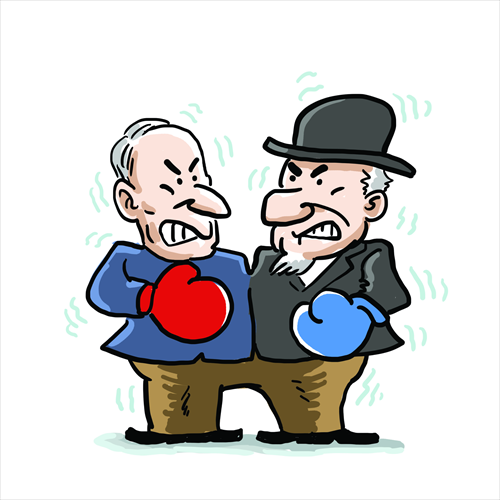‘Interdependent hegemony’ the face of new world order as new powers emerge

Illustration: Liu Rui/GT
The notion of "hegemony" at the international level refers to how the construction of an order, driven by social forces occupying a leading position within a nation-state, is projected outward on a world scale, shaping the international order.
The US, after WWII, has been seen as the global hegemon who paved and paid for the foundation of the postwar world order.
If "world order" is defined as the general acceptance of "norms, values, rules and practices" that are shaped, often imposed, by the hegemonic state or states, in this case the US or the West, then it is not difficult to understand why today the hegemonic powers are watching carefully how the rising states are applying their power to the existing world order. Historical lessons suggest that emerging powers can generate a dramatic and even violent impact on the existing order.
For the prevailing powers to safeguard the existing world order, they must maintain the patterns of global relationships that have perpetuated the gross inequalities in the international order, as well as the tremendous privilege and power this global disparity of wealth has brought for the existing hegemons.
Since the beginning of the new millennium, the world has been witnessing the emergence of a new incipient form of hegemony: "interdependent hegemony." It seems to no longer be viable to think of hegemony based on the dominance of one single country or on the universalization of norms and values.
Hegemony still exists, but in a different form. It is not surprising that the emerging powers explicitly engender the sense there is an anti-Western alliance as a counterbalance, as a way to enhance multilateralism or avoid unipolar US hegemony, but not as an alternative hegemony to shape a new world order.
Interdependent hegemony implies a set of relationships between the existing and the emerging powers.
First, the emerging powers are the most active players for globalization and transnational capitalism, while the existing powers are being hampered by the global financial crisis brought about by globalization.
Second, the emerging powers are benefiting from the existing world order and becoming successful, while at the same time are challenging some of the ideological and practical foundations laid down by the existing powers.
Third, the emerging powers are vigorously participating in the Western "neoliberal project" - globalization, marketization and competition, whereas their forms of state capitalism are performing better through the "governed market," rather than the "free market"
The rise of China, together with its challenge to the world order today, is opening up multiple new norms and values regarding what makes nations grow and the set of mutually dependent relationships between property rights and economic growth, between the rule of law and the market economy, between free currency flow and economic order, and, most importantly, between democracy and development.
The declining US hegemony and the global financial crisis make it evident that the existing world order is suffering various crises, ranging from economic problems to issues surrounding legitimacy and authority.
Today, no existing and emerging power is capable of hegemonizing and leading the world while making economy and ideology confluent. While the existing powers are crisis-ridden and powerless to define and defend the post-superpower world order, the major emerging powers such as Russia and China are testing the extent of the hegemonic vacuum and the limit of the existing order in terms of the rules of the game.
The existing powers are losing their hegemony, but the emerging powers have produced neither a unified ideology nor a new institutional framework for global governance that is politically and ideologically universal.
The world is facing two sides of the same coin, one negative and another positive: the return of "great power rivalry" characterized by conflicts and wars, and an "interdependent hegemony" characterized by accommodation and integration.
Nowadays, the existing and emerging powers are intertwined in a constant process of shaping and reshaping the international order in the nexus of national interest, regional orientation, common political agenda, political alliances, and potential conflict.
The author is Professor and Director of the Research Center on Development and International Relations, Aalborg University. opinion@globaltimes.com.cn